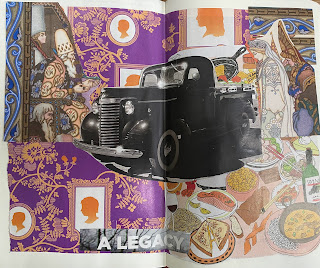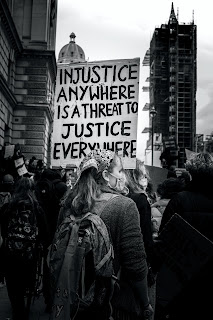Day 36 – Referencing mestiza consciousness with respect
.jpg) |
I don’t have a quick answer, but I am looking at the ways that others have also referenced Anzaldua’s work. I particularly enjoyed Hernández-Wolfe (2011)’s description of Anzaldúa’s mestiza consciousness as “borderlands epistemology.” She writes,
Borderland thinking addresses our right to self-representation as individuals and as a collective. These issues of self-representation are about both the development of a personal identity and a professional identity. As people who struggle with using eurocentric ideas about race to represent ourselves and who are habituated to hybridity we have the right to construct, name, author, co-author, and implement healing models and methods that address the worlds we inhabit. The borderlands are the places in between, the spaces in which border knowledge and border identities are constructed (Rosaldo, 1993; Mignolo & Tlostanova, 2006). According to Anzaldu´a (1987), mestiza consciousness is the consciousness of our hybridity. Borderlands refer to overlapping border spaces and the cultural representations that those of us who inhabit these spaces negotiate in order to exercise personal and collective agency. The self-awareness developed in these spaces, the embracement of our multiple identities as a whole, fosters the transcendence of the barriers which dominant groups have imposed on us. (p. 298)
The borderland experiences described by Anzaldúa is one that has resonated with many communities in the last few decades. Another example I’d like to share is a reference to borderlands in Hardy and Monypenny’s (2019) article on Queering queer spaces: Journey of a creative arts program for trans, non-binary, and gender creative youth. They write,
In creating this program, we found ourselves in the borderlands, to use the metaphor and theoretical framework developed by Anzaldúa (1987), wherein she explored the etiology of existing as “ni de aquí, ni de allá” [neither here, nor there]. Anzaldúa examined the discomfort and the adaptability of borderland consciousness, of cultural displacement. The borderland we claim is the space between more traditional concepts of a mental health treatment program and that of community-centered work.
Furthermore, transgender youth already exist within borderlands, navigating the blurred lines of gender expression throughout their lives: across school, community spaces, religious institutions, family expectations, and peer relationships. Just as Anzaldúa (1987) honored the pain and celebrated the powerful resilience and adaptability her identity encompasses, we wanted to engage the wholeness of the both/and space that exists between and beyond binaries. We asked ourselves: What are the needs of gender creative youth? Can we uniquely address them as creative arts therapists? And as our field continues to grow into community spaces, including LGBTQ+ centers, we must ask the question: How do we approach this work? (p. 2-3)
Clearly, Anzaldúa’s work speaks to many. I want to be able to do it justice and will continue to think about how to do so within my writing. Meanwhile, I hope that as more folks become familiar with her work – they will go directly to the source.
Anzaldúa, G.E. (1999) Borderlands/La Frontera: The New Mestiza (2nd ed.). Aunt Lute Books. (Original work published 1987)
Hardy, S. & Monypenny, J. (2019). Queering queer spaces: Journey of a creative arts program for trans, non-binary, and gender creative youth. Voices: A World Forum for Music Therapy, 19(3). https://doi.org/10.15845/voices.v19i3.2687
Hernández-Wolfe, P. (2011). Decolonization and “mental” health: A mestiza's journey in the borderlands. Women & Therapy, 34(3), 293-306. doi:10.1080/02703149.2011.580687



Comments